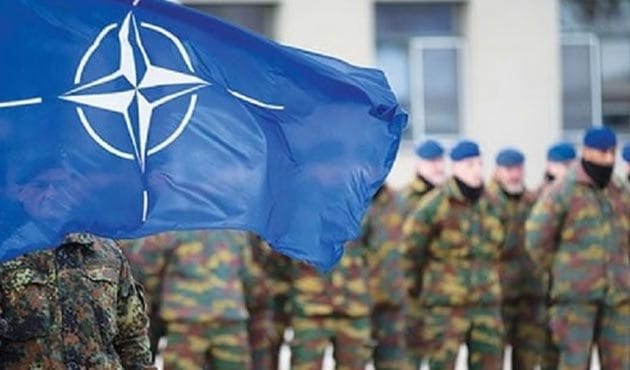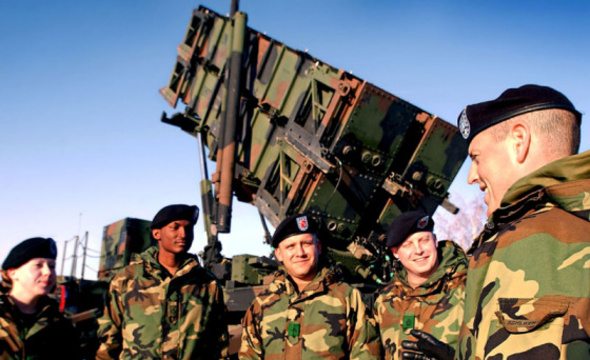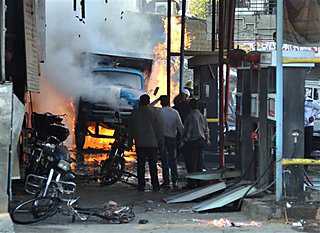Justification could put Soros-tied New World Order initiative on the march
TEL AVIV – Turkey, a member of NATO, is pushing for a larger NATO meeting to decide whether to launch an international military campaign against Syria, according to a senior Syrian official speaking to WND.
Earlier this month, NATO stepped up its support for Turkey when NATO allies decided to deploy Patriot missiles in Turkey to augment the country’s air defenses against Syria.
The move followed the reported use by Syria of more advanced missiles to target the so-called rebels fighting the embattled regime of Bashar al-Assad.
Any NATO deployment would likely come under the banner of Responsibility to Protect.
Responsibility to Protect, or Responsibility to Act, as cited by President Obama, is a set of principles, now backed by the United Nations, based on the idea that sovereignty is not a privilege but a responsibility that can be revoked if a country is accused of “war crimes,” “genocide,” “crimes against humanity” or “ethnic cleansing.”
The term “war crimes” has at times been indiscriminately used by various U.N.-backed international bodies, including the International Criminal Court, or ICC, which applied it to Israeli anti-terror operations in the Gaza Strip. There has been fear the ICC could be used to prosecute U.S. troops.
Billionaire activist George Soros’ Open Society Institute is also one of only three nongovernmental funders of the Global Centre for the Responsibility to Protect, the group that devised the doctrine.
Obama’s national security adviser, Samantha Power, helped to found Responsibility to Protect, which was also devised by several controversial characters, including Palestinian legislator Hanan Ashrawi, a staunch denier of the Holocaust who long served as the deputy of late Palestinian Liberation Organization leader Yasser Arafat.
Power, in April, was named the head of the new White House Atrocities Prevention Board.
The Carr Center for Human Rights Policy, founded by Power, had a seat on the advisory board of the 2001 commission that original founded Responsibility to Protect.
The commission is called the International Commission on Intervention and State Sovereignty. It invented the term “responsibility to protect” while defining its guidelines.
The Carr Center is a research center concerned with human rights located at the Kennedy School of Government at Harvard University.
Power was Carr’s founding executive director and headed the institute at the time it advised in the founding of Responsibility to Protect. With Power’s Carr Center on the advisory board, the International Commission on Intervention and State Sovereignty first defined the Responsibility to Protect doctrine.
Soros-funded
The Global Centre for Responsibility to Protect is the world’s leading champion of the military doctrine.
Soros’ Open Society Institute is a primary funder and key proponent of the Global Centre for Responsibility to Protect. Several of the doctrine’s main founders sit on boards with Soros.
Activists Ramesh Thakur and Gareth Evans, for example, are the original founders. The two sit on multiple boards with Soros.
Board members of the Global Centre for the Responsibility to Protect include former U.N. Secretary-General Kofi Annan, former Ireland President Mary Robinson and South African activist Desmond Tutu.
Robinson and Tutu have made solidarity visits to the Hamas-controlled Gaza Strip as members of a group called The Elders, which includes former President Jimmy Carter.
Annan once famously stated: “State sovereignty, in its most basic sense, is being redefined – not least by the forces of globalization and international cooperation. States are … instruments at the service of their peoples and not vice versa.”
Right to ‘penetrate nation-states’ borders’
Soros himself outlined the fundamentals of Responsibility to Protect in a 2004 Foreign Policy magazine article titled “The People’s Sovereignty: How a New Twist on an Old Idea Can Protect the World’s Most Vulnerable Populations.”
In the article, Soros asserted, “True sovereignty belongs to the people, who in turn delegate it to their governments.
“If governments abuse the authority entrusted to them and citizens have no opportunity to correct such abuses, outside interference is justified,” Soros wrote. “By specifying that sovereignty is based on the people, the international community can penetrate nation-states’ borders to protect the rights of citizens.
“In particular, the principle of the people’s sovereignty can help solve two modern challenges: the obstacles to delivering aid effectively to sovereign states, and the obstacles to global collective action dealing with states experiencing internal conflict.”
More Soros ties
“Responsibility” founders Evans and Thakur served as co-chairmen on the advisory board of the International Commission on Intervention and State Sovereignty, which invented the term “responsibility to protect.”
In his capacity as co-chairman, Evans also played a pivotal role in initiating the fundamental shift from sovereignty as a right to “sovereignty as responsibility.”
Evans presented Responsibility to Protect at the July 23, 2009, United Nations General Assembly, which was convened to consider the principle.
Thakur is a fellow at the Centre for International Governance Innovation, which is in partnership with an economic institute founded by Soros.
Soros is on the executive board of the International Crisis Group, a “crisis management organization” for which Evans serves as president-emeritus.
New world order
Doctrine founder Thakur has advocated a “global rebalancing” and “international redistribution” to create a “New World Order.”
In a piece in March 2011 in the Ottawa Citizen newspaper, “Toward a New World Order,” Thakur wrote, “Westerners must change lifestyles and support international redistribution.”
He was referring to a United Nations-brokered international climate treaty in which it was argued, “Developing countries must reorient growth in cleaner and greener directions.”
In the opinion piece, Thakur then discussed recent military engagements and how the financial crisis has impacted the U.S.
“The West’s bullying approach to developing nations won’t work anymore – global power is shifting to Asia,” he wrote. “A much-needed global moral rebalancing is in train.”
Thakur continued: “Westerners have lost their previous capacity to set standards and rules of behavior for the world. Unless they recognize this reality, there is little prospect of making significant progress in deadlocked international negotiations.”
Thakur contended “the demonstration of the limits to U.S. and NATO power in Iraq and Afghanistan has left many less fearful of ‘superior’ Western power.”
With additional research by Brenda J. Elliott
Read more at https://www.wnd.com/2012/12/turkey-pushing-for-nato-attack-on-syria/#K9HMX17L1vzCgvjP.99



